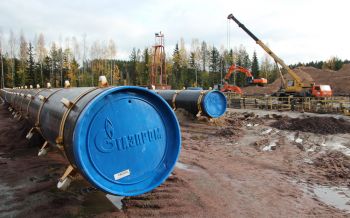As 2019 draws to a close, and just a few days before the expiration of Ukraine’s transit deal with Russia, news reaches us that the tripartite talks between Russia, Ukraine and the EU may finally be making progress after months of failure. Details are still sketchy, but it seems Russia and Ukraine have agreed a deal “in principle” in the face of a multitude of arbitrations relating to pricing and payment disputes which have all but brought gas supplies on Russia’s main European export route to a halt.
The tyranny of the deadline – one that we journalists are very familiar with – can certainly yield results. But whatever the outcome of the talks, the undulating tension between Ukraine and Russia over the past decade has changed the make-up of European gas flows forever. European gas storage facilities are full to the brim, as suppliers brace for the potential mid-winter failure of the talks. The Trans-Balkan pipeline is set to be reconfigured to reduce the prevalence of Russian gas in southern and eastern Europe. First gas is flowing through the Greek section of the Trans-Adriatic Pipeline (TAP) due to be completed next year, marking the arrival of the first gas from the Southern Gas Corridor. The EU, despite its ambiguous approach to new gas infrastructure, has just sanctioned a triple package of subsidies to support the proposed Krk LNG terminal in Croatia.
But Gazprom has not rested on its laurels either. In the face of US opposition, pipe laying for the 55 Bcm/y NordStream 2 is set to be completed in early January, eventually doubling the volumes of Russian gas entering Europe via Germany. Flows through TurkStream will begin by the end of this year, Gazprom claims, with a second string landing in south-eastern Europe starting up next year.
Rumours are also circulating that NordStream 2 will be “hydrogen-ready”, the first indication that Gazprom is serious about participating in Europe’s ambitious decarbonisation plans.
We go into 2020 looking at an almost unrecognisable horizon to that of 2010.
Decarbonisation has taken an increasingly central role in Gas Matters’ coverage this year and for good reason. The failure of December’s COP25 talks once again highlights the absence of leadership on climate change. The gas industry’s palpable anxiety about the role of gas - in a world that cannot agree on the best path - needs to be addressed. Our coverage seeks to cut through the uncertainty, engaging with the ideas and solutions floating in from all directions and putting them under a critical lens with rigour and integrity.
To that end, we have an exciting editorial calendar planned for Gas Matters in 2020. We’ll be looking at the rise of flaring in the Permian, Ukraine’s renewed efforts to overcome decades of entrenched monopolies, and asking whether the UN the right body to lead on climate change. We’ll continue to analyse Europe’s decarbonisation of its energy networks, examining sector coupling and electrification. We’ll look at how Argentina’s gas industry is faring under its new regime. Political events, as ever, will shape our coverage: the US presidential election could have implications for the fragile scaffolding of the US-China trade deal, while carbon trading analysts will be keeping a careful eye on the impact of Brexit on the EU ETS.
Thank you for continuing to support Gas Matters. From all of us at Gas Strategies Information Services, we wish you a Merry Christmas and a happy New Year.
Rachel Parkes
Editor
Gas Matters
Subscription Benefits
Our three titles – LNG Business Review, Gas Matters and Gas Matters Today – tackle the biggest questions on global developments and major industry trends through a mixture of news, profiles and analysis.
LNG Business Review
LNG Business Review seeks to discover new truths about today’s LNG industry. It strives to widen market players’ scope of reference by actively engaging with events, offering new perspectives while challenging existing ones, and never shying away from being a platform for debate.
Gas Matters
Gas Matters digs deep into the stories of today, keeping the challenges of tomorrow in its sights. Weekly features and interviews, informed by unrivalled in-house expertise, offer a fresh perspective on events as well as thoughtful, intelligent analysis that dares to challenge the status quo.
Gas Matters Today
Gas Matters Today cuts through the bluster of online news and views to offer trustworthy, informed perspectives on major events shaping the gas and LNG industries. This daily news service provides unparalleled insight by drawing on the collective knowledge of in-house reporters, specialist contributors and extensive archive to go beyond the headlines, making it essential reading for gas industry professionals.





